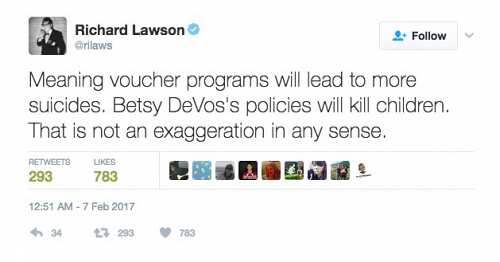Country music star Eric Church recently took the unprecedented step of cancelling 25,000 tickets to his spring tour that he claims were purchased by scalpers. The cancelled tickets will be up for re-sale so his “true” fans can purchase them. In fact, this effort to curtail scalping harms his fans – who does he think bought or will buy the tickets from scalpers? I recently tried to buy tickets to an event but was barred from buying more than 2 at a time. Ever. Had I bought two and went back and bought two more I would have been branded a scalper and all 4 tickets cancelled. Net effect: I just won’t go; it’s my whole family or none of us. Oh well. So I have no doubt many of those 25,000 were people like me who tried to skirt the stupid rules just so a family or group of friends could all go to a concert and actually sit together.
The idea that scalpers cause high prices is as persistent a ‘cart pushes the horse’ myth as is the notion college education causes success. Scalpers provide an invaluable public service. They identify and solve glaring supply problems. They make it possible for poor planners, the blissfully unaware, and the peripatetic to enjoy a show at a moment’s notice. In my college days I was in Paris for a summer study abroad. Through last minute word of mouth I happened to find out Pink Floyd was in concert one evening. Of course it had been sold out months before I arrived, but that was no problem. I walked up to the venue and in a few seconds had bought a ticket from a scalper. Couldn’t have been easier. Now someone might argue (incorrectly) that had there been no scalpers I could have bought one at the box office for a normal price. Ten minutes before show start? I don’t think so – not with a band as popular as Pink Floyd at the time.
But, that scenario actually could take place (box office purchase) if only the artists would stop ignoring basic economics. If something is in high demand (seating at a show) but the supply is low (seats x shows) the solution is to not to set an artificially low price and cover your eyes and ears and stamp your feet demanding scalpers not buy the tickets. The solution is to (a) raise prices or (b) increase supply (more shows or more seats). If they truly want all their fans to have an opportunity to see them perform they need to stop selfishly withholding their talents and perform more frequently!
The two most vilified economic activities, piracy and scalping, are both the result of producers over or under estimating their own worth. If someone is pirating your goods then you are charging too much. If someone is scalping your goods then you are charging too little. Think about it: if music and movies were priced at a nickel each, all piracy would cease. The irony is the studios would make more money following this model. Riches are obtained more readily not from charging high prices to a few but rather low prices to the many (which is why price based competition, in contrast to quality or service based competition, is the most popular tool at gaining sales).
Looking back to our example of scalping we can see that if performers charged what the scalpers charged, the scalpers would realize no more arbitrage advantage to scalping and would cease. Airlines do this rather well, offering a range of ticket prices all of which are still high enough there is nothing to gain by scalping them (ignoring security issues today, but this was true in the past when tickets had no names on them).
These performers are a “victim” of their own success. There is only one of them, so increasing popularity means more and more will vie for contact. They have no choice but to charge more or devote more time to their fans. Supply and demand is as inexorable as gravity: sooner or later it will win.




